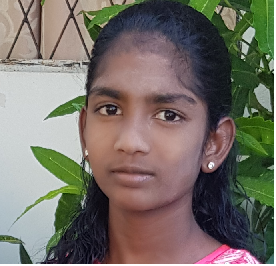Sreshika Yasotharan
Sponsor This Child 

Age : 15 Years 8 Month 19 Days
Birthday : 29/04/2009
Gender : Male
Location : Cornerstone Community Foundation
Child ID: IC-SR841705
Waiting: would you change my destiny by sponsoring me.
- Overview
- Community
- Country
- Costing for this child
Partly disabled
The Kilinochchi town was established in 1936 as part of a colonization project that sought to ease overpopulation and unemployment in Jaffna, North of Srilanka.
Most of the people living in this district are farmers and related to agricultural work. Most of the people were migrated from Jaffna, after the devastating civil war, to acquire government grants for land and to engage in paddy (rice) cultivation.
The Sri Lankan Civil War was an armed conflict fought on the island of Sri Lanka. Beginning on 23 July 1983, there was an intermittent insurgency against the government by the Liberation Tigers of Tamil Eelam (the LTTE, also known as the Tamil Tigers), which fought to create an independent Tamil state called Tamil Eelam in the north and the east of the island. After a 26-year military campaign, the Sri Lankan military defeated the Tamil Tigers in May 2009, bringing the civil war to an end.
For over 25 years, the war caused significant hardships for the population, environment and the economy of the country, with an initial estimated 80,000–100,000 people killed during its course. In 2013, the UN panel estimated additional deaths during the last phase of the war: "Around 40,000 died while other independent reports estimated the number of civilians dead to exceed 100,000." During the early part of the conflict, the Sri Lankan forces attempted to retake the areas captured by the LTTE. The tactics employed by the Liberation Tigers of Tamil Eelam against the actions of Government forces resulted in their listing as a terrorist organisation in 32 countries, including the United States, India, Canada and the member nations of the European Union. The Sri Lankan government forces have also been accused of human rights abuses, systematic impunity for serious human rights violations, lack of respect for habeas corpus in arbitrary detentions, and forced disappearances.
After two decades of fighting and four failed tries at peace talks, including the unsuccessful deployment of the Indian Army, the Indian Peace Keeping Force from 1987 to 1990, a lasting negotiated settlement to the conflict appeared possible when a cease-fire was declared in December 2001, and a ceasefire agreement signed with international mediation in 2002. However, limited hostilities renewed in late 2005 and the conflict began to escalate until the government launched a number of major military offensives against the LTTE beginning in July 2006, driving the LTTE out of the entire Eastern province of the island. The LTTE then declared they would "resume their freedom struggle to achieve statehood".
In 2007, the government shifted its offensive to the north of the country, and formally announced its withdrawal from the ceasefire agreement on 2 January 2008, alleging that the LTTE violated the agreement over 10,000 times. Since then, aided by the destruction of a number of large arms smuggling vessels that belonged to the LTTE, and an international crackdown on the funding for the Tamil Tigers, the government took control of the entire area previously controlled by the Tamil Tigers, including their de facto capital Kilinochchi, main military base Mullaitivu and the entire A9 highway, leading the LTTE to finally admit defeat on 17 May 2009.Following the LTTE's defeat, pro-LTTE Tamil National Alliance dropped its demand for a separate state, in favour of a federal solution. In May 2010, Mahinda Rajapaksa, the then president of Sri Lanka, appointed the Lessons Learnt and Reconciliation Commission (LLRC) to assess the conflict between the time of the ceasefire agreement in 2002 and the defeat of the LTTE in 2009.
General Costing : $100.00
Costing With Critical Needs : $100.00
Waiting : would you change my destiny by sponsoring me


 Facebook
Facebook Twitter
Twitter Google +
Google +